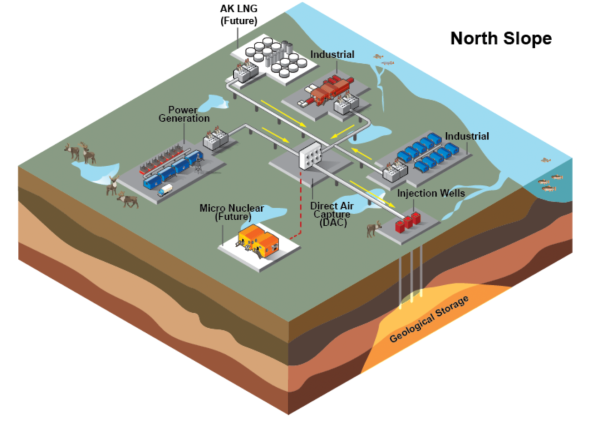
The pressure to reduce carbon emissions is forcing a major shift in the oil industry. Australian oil company Santos is taking a bold step with its new Alaskan development, the Pikka oil field, which they claim will be "climate-friendly."

>> In Other News: ATCO EnPower, Shell Move Forward with Atlas Carbon Storage Hub Project
Santos in Alaska: A New Player on the North Slope
Santos, a well-established Australian oil and gas company, is entering the Alaskan scene with the Pikka project. This significant development on Alaska's North Slope holds the potential to reshape the state's oil industry.
Strategies for Decarbonization: Beyond Offsets
Santos' approach goes beyond the typical industry practice of carbon offsets, which involve investing in projects that reduce carbon elsewhere to compensate for emissions produced. Their plan incorporates two innovative strategies:
Carbon Capture and Storage (CCS): Santos aims to capture emissions directly from North Slope power plants and drill pads. They also plan to explore "direct air capture," a new technology that sucks carbon dioxide out of the air. The captured carbon would then be safely stored underground.
Offsets: Santos acknowledges the role of offsets in achieving net-zero emissions. They might invest in projects like reforestation or renewable energy initiatives to compensate for the emissions generated by burning the extracted oil.
Impact on Alaska's Oil Industry
Santos' commitment to decarbonization stands in contrast to the practices of established Alaskan oil companies like ConocoPhillips. This could influence future regulatory policies and public perception within the state. The potential economic benefits include job creation in new technology sectors and a more sustainable long-term future for Alaska's oil industry.

Broader Implications for Global Carbon Reduction
Santos' strategies align with the goals of the Paris Agreement, a landmark international treaty on climate change. Their success could inspire other oil companies to adopt similar practices. However, the scalability of CCS and offsets as solutions for large-scale carbon reduction remains a question.
Challenges and Skepticism
Concerns exist regarding the cost-effectiveness and technological feasibility of CCS and direct air capture. Environmental groups criticize these technologies as a potential delay tactic for transitioning away from fossil fuels altogether. Transparency and accountability are crucial to address concerns about "greenwashing," a tactic where companies create a misleading impression of environmental responsibility.
A Promising Step Towards a Sustainable Future
Santos' innovative approach to decarbonization in Alaska represents a significant step forward. While challenges remain, their efforts hold promise for positive impacts on both local and global scales. Continued investment in research and development of these technologies is crucial for a future where the oil industry can coexist with a healthy planet.
Subscribe to the newsletter
Daily decarbonization data and news delivered to your inbox
Follow the money flow of climate, technology, and energy investments to uncover new opportunities and jobs.
Latest issues
-
Inside America’s Carbon Capture Reality Check
Inside This Issue ⚡ Duke Energy Florida Goes Live With First 100% Hydrogen System ✈️ Air bp Signs Agreement With Airbus on Flight Services and Fuel Supplies in Europe 🌊 Pairing Reefs and Mangroves...
-
Three Nebraska Plants Prove Ethanol CCS Actually Works
Inside this Issue 🌽 Three Nebraska Plants Prove Ethanol CCS Actually Works ☀️ SunHydrogen and CTF Solar Sign Agreement to Accelerate Hydrogen Panel Manufacturing 🧪 GenH2 Completes Major Milestone:...
-
DOE Doubles Down on $1/kg Clean Hydrogen Goal
Inside This Issue 🎯 Doe Doubles Down on $1/kg Clean Hydrogen Goal 🕳️ Quebec Introduces First Legal Framework for Underground CO2 Storage 🧪 Charbone Announces Its First Hydrogen Supply Hub in the O...
Company Announcements
-
JERA Announces Close of Haynesville Shale Gas Asset in Louisiana
TOKYO and HOUSTON, Feb. 12, 2026 /PRNewswire/ -- JERA Co. Inc., a global energy leader and Japan's largest power generation company, today announced that through its subsidiary JERA Americas Inc., ...
-
Buffalo Biodiesel Inc. (“BBD”), a leading recycler of waste vegetable used cooking oil (WVUCO) and producer of renewable feedstocks, announced that they have officially renewed a Part 364 Waste Tra...
-
Air bp Signs Agreement With Airbus on Flight Services and Fuel Supplies in Europe
Air bp has signed a multi-year contract with Airbus for the supply of conventional aviation fuel, sustainable aviation fuel (SAF), and related services in Germany and Spain. This agreement enables ...
-
BEND, Ore.--Element 1® Corp. (“e1”), an Oregon-based leader in methanol-to-hydrogen generation technology, today announced the signing of a Memorandum of Understanding (MOU) with Aurosi Precision C...